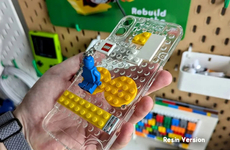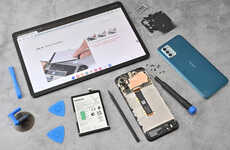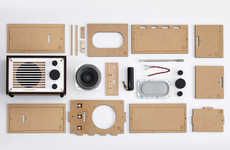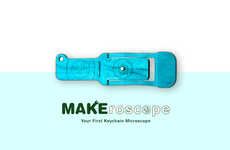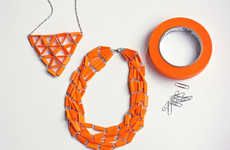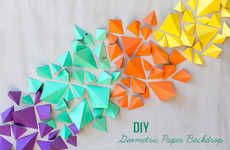
David Mellis' DIY Mobile Phone Defies Mass Production
Katherinev123 — June 21, 2012 — Art & Design
References: hlt.media.mit.edu & fashioningtech
As many companies are beginning to understand, do-it-yourself is serious business, which underlines the importance of exploring DIY products like this DIY mobile phone by MIT Ph.D. student David Mellis.
Mellis, who is part of MIT's High-Low Tech group, has created this DIY mobile phone to explore the "possibilities for individual construction and customization of the most ubiquitous of electronic devices, the cellphone," as the High-Low Tech blog states. One of the goals was to test the potential of the popular DIY practice in regards to consumer electronics, and to understand the requirements necessary for people to build their own gadgets.
The phone uses open source designs for its casing and circuit board. The DIY mobile phone prototype itself accepts standard SIM cards, and it features a laser-cut plywood encasing as well as as a 1.8-inch TFT screen.
Mellis, who is part of MIT's High-Low Tech group, has created this DIY mobile phone to explore the "possibilities for individual construction and customization of the most ubiquitous of electronic devices, the cellphone," as the High-Low Tech blog states. One of the goals was to test the potential of the popular DIY practice in regards to consumer electronics, and to understand the requirements necessary for people to build their own gadgets.
The phone uses open source designs for its casing and circuit board. The DIY mobile phone prototype itself accepts standard SIM cards, and it features a laser-cut plywood encasing as well as as a 1.8-inch TFT screen.
Trend Themes
1. DIY Electronics - The DIY trend in electronics is creating opportunities for individual construction and customization of ubiquitous electronic devices, like cellphones.
2. Open Source Design - Open source designs become an emerging trend in creating electronic gadgets which give consumers the possibility to assemble their devices like this DIY mobile phone.
3. Customization - Customization is trending as more consumers crave unique products, and this DIY mobile phone provides a way for customization creating a unique mobile phone that made by themselves.
Industry Implications
1. Consumer Electronics - The consumer electronics industry can disruptively innovate to cater to the DIY trend by offering more open-source designs to allow for customization of electronic devices.
2. Phone Accessories - The phone accessories industry can capitalize on this trend of DIY mobile phone cases through offering easy-to-use tools such as laser cutters for consumers to customize their devices.
3. Telecommunications - The telecommunications industry can benefit from this trend by offering more educational resources for customers who seek to build their own gadgets like a DIY mobile phone.
3.1
Score
Popularity
Activity
Freshness



